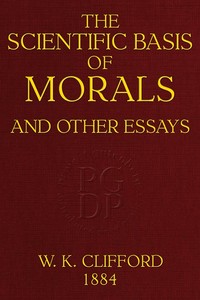The Scientific Basis of Morals, and Other Essays by William Kingdon Clifford
Read now or download (free!)
| Choose how to read this book | Url | Size | ||||
|---|---|---|---|---|---|---|
| Read online (web) | https://www.gutenberg.org/ebooks/50189.html.images | 289 kB | ||||
| EPUB3 (E-readers incl. Send-to-Kindle) | https://www.gutenberg.org/ebooks/50189.epub3.images | 251 kB | ||||
| EPUB (older E-readers) | https://www.gutenberg.org/ebooks/50189.epub.images | 256 kB | ||||
| EPUB (no images, older E-readers) | https://www.gutenberg.org/ebooks/50189.epub.noimages | 165 kB | ||||
| Kindle | https://www.gutenberg.org/ebooks/50189.kf8.images | 340 kB | ||||
| older Kindles | https://www.gutenberg.org/ebooks/50189.kindle.images | 313 kB | ||||
| Plain Text UTF-8 | https://www.gutenberg.org/ebooks/50189.txt.utf-8 | 244 kB | ||||
| Download HTML (zip) | https://www.gutenberg.org/cache/epub/50189/pg50189-h.zip | 233 kB | ||||
| There may be more files related to this item. | ||||||
Similar Books
About this eBook
| Author | Clifford, William Kingdon, 1845-1879 |
|---|---|
| Title |
The Scientific Basis of Morals, and Other Essays Viz.: Right and Wrong, The Ethics of Belief, The Ethics of Religion |
| Note | Reading ease score: 58.2 (10th to 12th grade). Somewhat difficult to read. |
| Credits |
Produced by Jeroen Hellingman and the Online Distributed Proofreading Team at http://www.pgdp.net/ for Project Gutenberg (This file was produced from images generously made available by The Internet Archive/American Libraries.) |
| Summary | "The Scientific Basis of Morals, and Other Essays" by William Kingdon Clifford is a philosophical treatise written in the late 19th century. This work delves into the foundations of ethics, aiming to establish a moral framework based on scientific reasoning and human experience rather than simply adhering to traditional or religious doctrines. The essays explore how moral principles derive from social functions, the importance of community in defining right and wrong, and the relationship between conscience and responsibility. The opening of the treatise introduces the concept of "Morals or Ethic" as a response to human experiences of pleasure and displeasure associated with certain actions. Clifford outlines that the moral sense, which guides individuals in determining what actions are right or wrong, is shaped by both personal experience and the collective ethical codes of societies. He emphasizes that moral maxims should be rooted in scientific principles, suggesting that ethical guidelines evolve through natural selection as communities strive for survival. Additionally, he opens a discussion about the nature of the self, distinguishing between individual desires and a broader ‘tribal self,’ ultimately arguing that individual morals should align with the well-being of the community. (This is an automatically generated summary.) |
| Language | English |
| LoC Class | BJ: Philosophy, Psychology, Religion: Ethics, Social usages, Etiquette, Religion |
| Subject | Ethics |
| Category | Text |
| EBook-No. | 50189 |
| Release Date | Oct 12, 2015 |
| Copyright Status | Public domain in the USA. |
| Downloads | 221 downloads in the last 30 days. |
| Project Gutenberg eBooks are always free! | |

